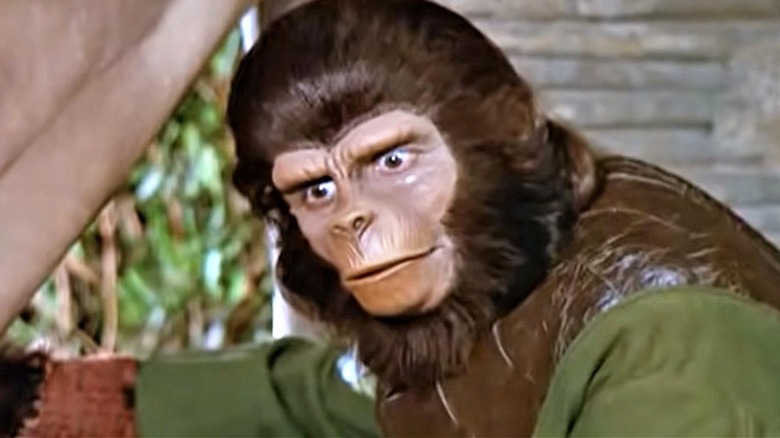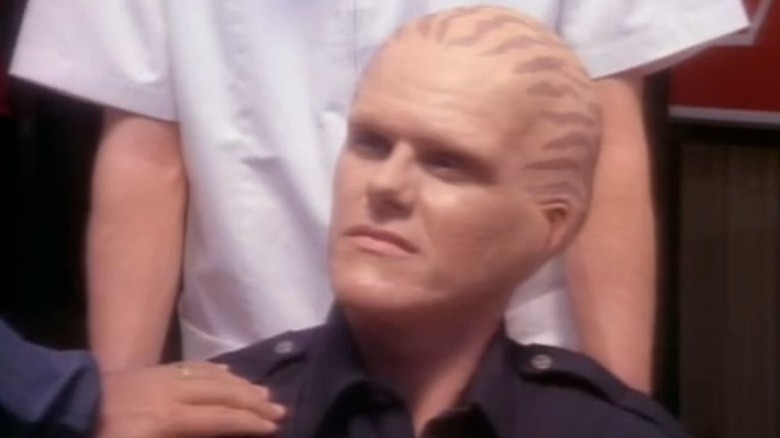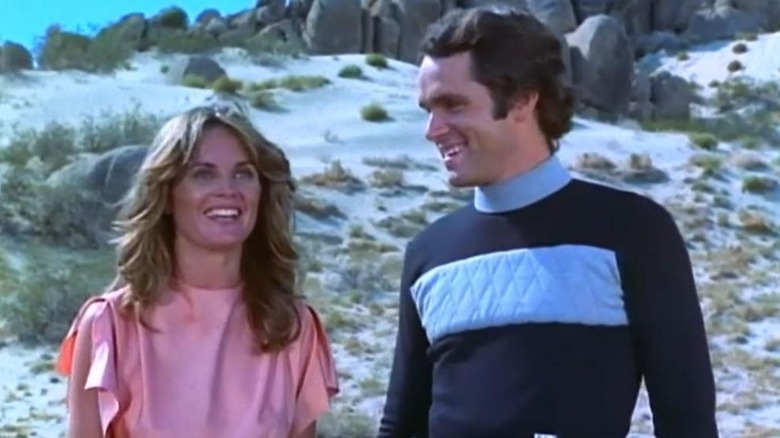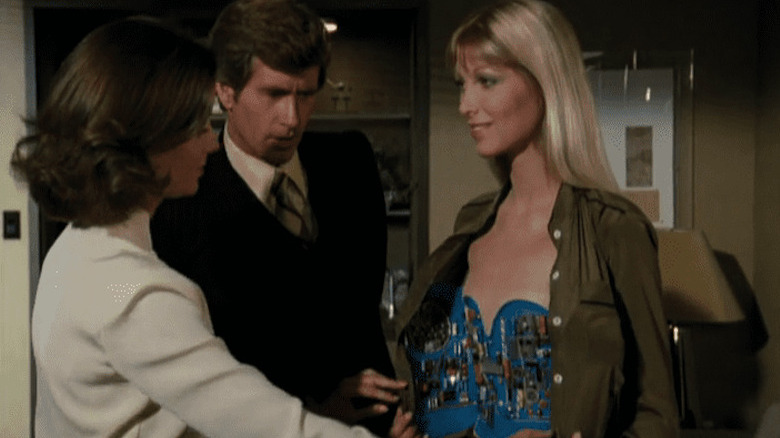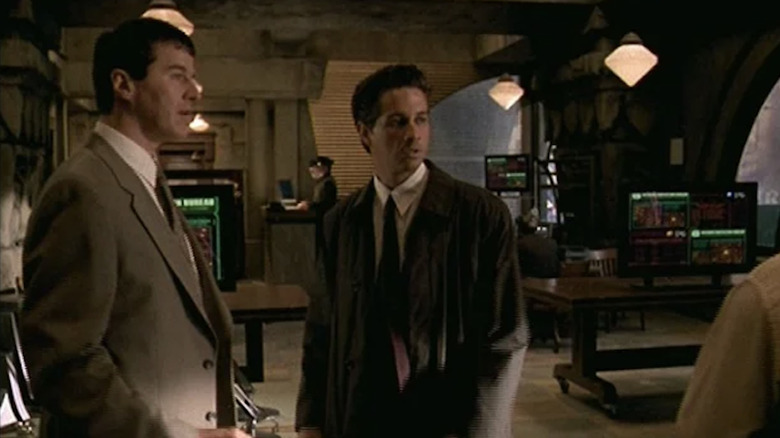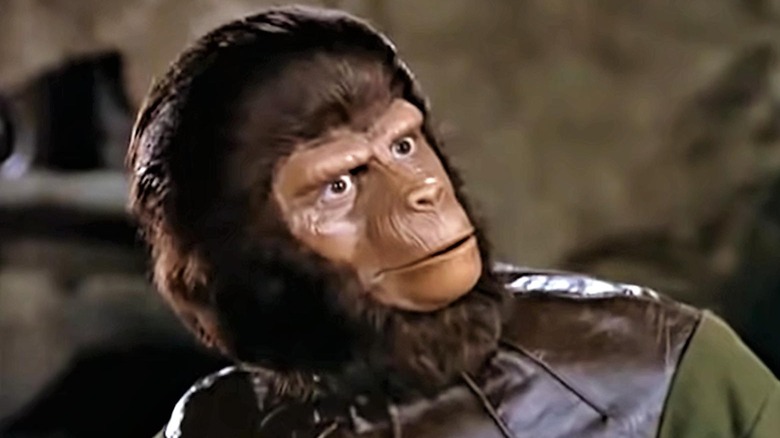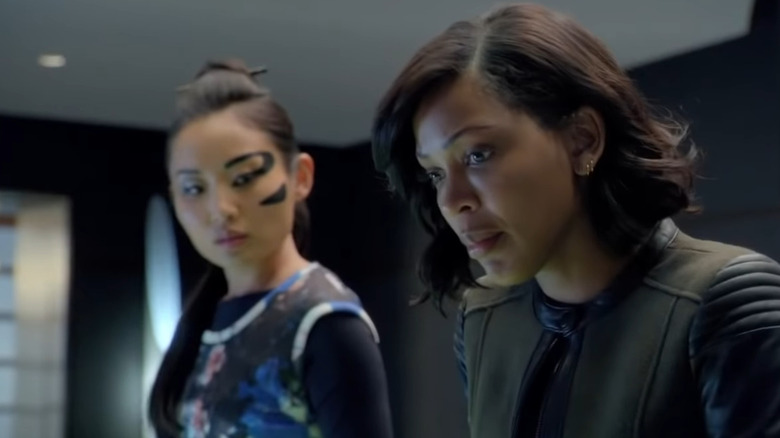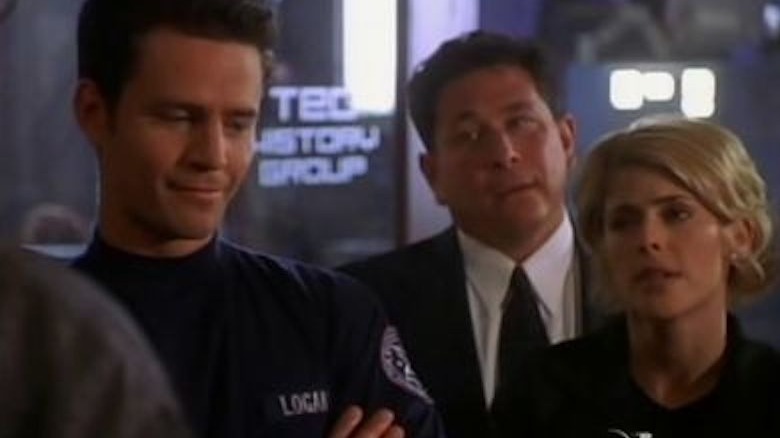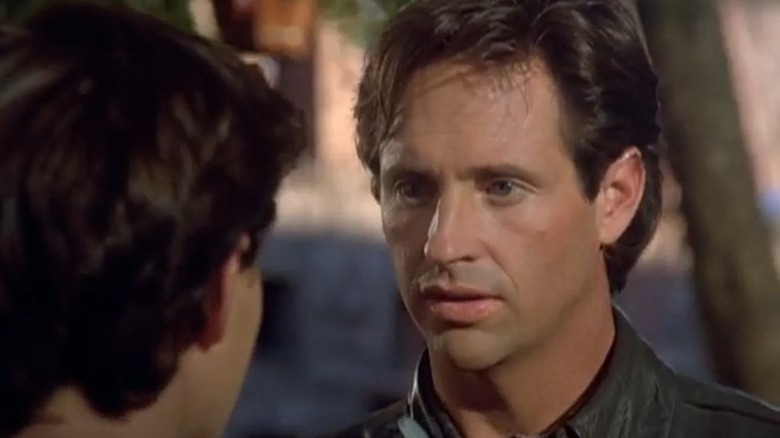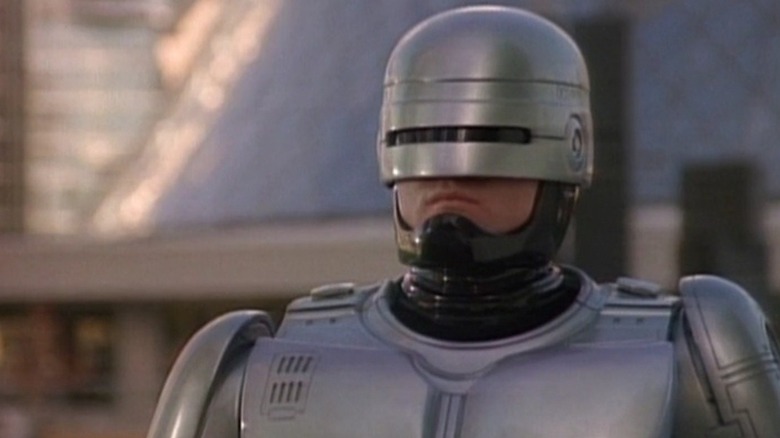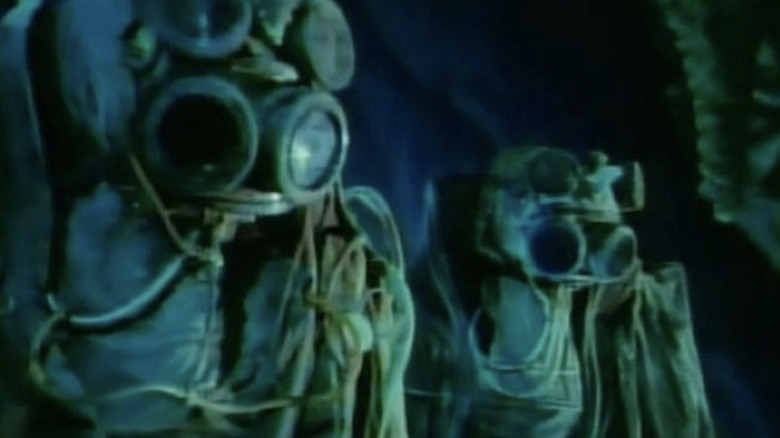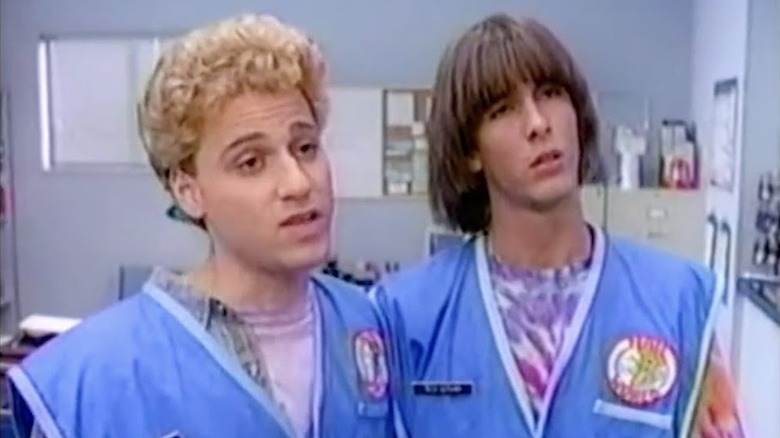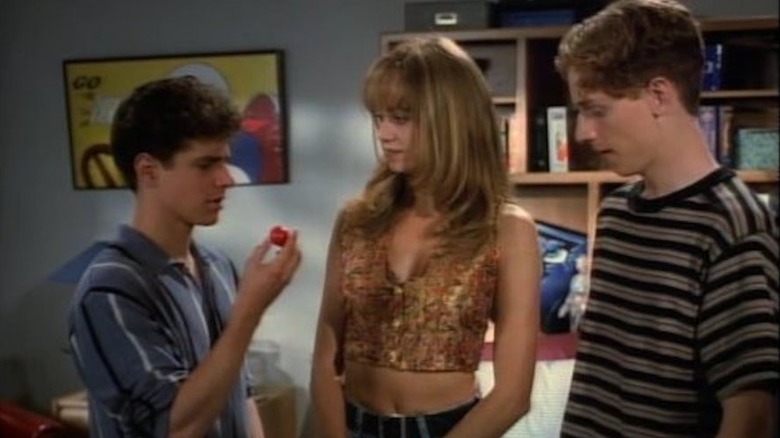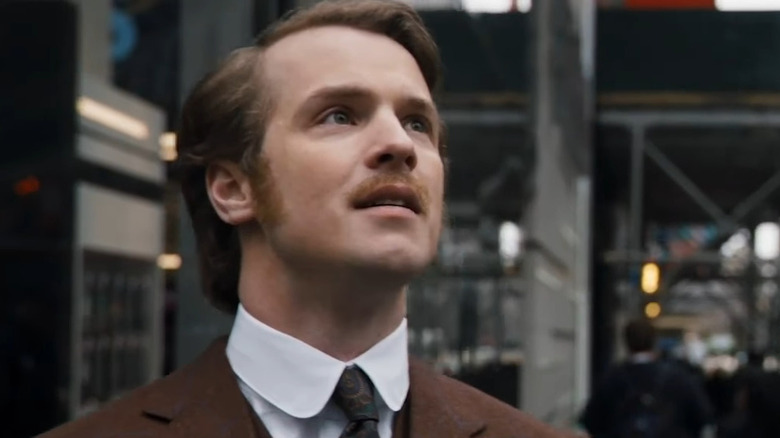Forgotten Sci-Fi TV Spin-Offs Based On Hit Movies
With the modern rise of streaming and prestige television, there have been a lot of new shows based on popular sci-fi movies. Acclaimed series like "Snowpiercer" and "The Man Who Fell To Earth" have found great success by pulling from the big-screen stories that preceded them. Bigger and bigger budgets these days mean showrunners can have a bigger canvas to play with, whether that means more impressive visual effects for a more sprawling story, or just the ability to cast better talent and bigger names in front of and behind the camera.
Of course, the idea of turning a popular science fiction film into a television series is nothing new, and even in the days of lesser effects and lower budgets, studios were spinning off sci-fi movies into small-screen series. You may not remember most of them. In fact, many have been long forgotten — buried beneath the sands of time — and most were canceled quickly. So set your quantum accelerators and get ready as we take a trip back in time to look at some forgotten sci-fi TV spin-offs based on hit movies.
Alien Nation
A surprise success, "Alien Nation" hit the big screen in 1988 with a story set three years after an alien race called the Newcomers arrive on Earth and integrate into human society. James Caan stars as Detective Matt Sykes, who's partnered with Newcomer Detective Sam Francisco (Mandy Patinkin) to hunt down a killer on the loose. A mix of crime noir, science fiction, and buddy cop tropes, the film yielded a TV spin-off one year later, with Gary Graham and Eric Pierpoint in the lead roles.
This new version, as reimagined by series creator Kenneth Johnson, is less a buddy cop action series and more of a gritty cop drama that explores real issues. In an interview with Games Radar, Johnson said he wanted to use the science fiction elements of the film to examine social and political problems and racial politics. On top of the police stories, the series put a focus on the problems of bigotry faced by Francisco's alien family as they integrate into Earth culture.
The series garnered mixed reviews upon release, and ratings at the time weren't strong enough to keep it afloat, leading to cancellation after just 22 episodes. Thankfully, perhaps due to the success of "The X-Files" later that decade, Fox was able to resurrect "Alien Nation" as a series of five television movies, with its final entry landing in 1997.
Logan's Run
"Logan's Run" established itself as a groundbreaking sci-fi adventure film when it premiered in 1976. Starring Michael York, who more modern audiences might know as Basil Exposition from the cast of the "Austin Powers" movies, the story is set in a bizarre future world where the government controls its resources by executing citizens when they turn 30. Logan 5 (York) is a former government enforcer who begins to challenge the system when he meets a young woman named Jessica 6 (Jenny Agutter). Together the pair go on the run through post-apocalyptic America in search of Sanctuary, a legendary utopia where they believe they can live out the rest of their natural lives.
Just a year after the film was released, a television adaptation arrived with a new cast, serving as a retelling and continuation of the story. The show chronicles much more of the characters' turbulent escape to the mythical city of Sanctuary and gives them a robot sidekick named Rem. Along their travels, Logan and Jessica encounter aliens, monsters, and robots, as well as other runners, rebels, and new cities. They have adventures in dreams and even do a bit of time traveling.
An ambitious series that may have bitten off a bit more than it could chew, "Logan's Run" couldn't keep up with other science fiction tales of the era. It lasted less than a year and completed just 14 episodes before being canceled.
Beyond Westworld
While HBO's "Westworld" reboot series is the franchise's most popular entry today, it's originally based on a 1973 science fiction film of the same name written by "Jurassic Park" author Michael Crichton. The movie even received a sequel in 1976 called "Futureworld," but what's rarely talked about is the spin-off television series broadcast later that same year, "Beyond Westworld."
Where the films see malfunctions lead to disaster in the titular android theme park, the series took a new angle. "Beyond Westworld" features a recurring villain, the sinister Simon Quaid (James Wainwright), who's stolen androids from the park for his own nefarious purposes. Looking to get their intellectual property returned, Delos — the corporation behind Westworld — sends security chief John Moore (Jim McMullan) to hunt them down. But the androids have infiltrated human society, and the series becomes a clever sci-fi procedural as Moore sets out to capture a new android replicant each week, whether it's a robot posing as a rock star, a corporate board member, a military sub commander, or a police officer.
A promising premise, it may have been a little ahead of its time, and it never quite took off. The fact that only five episodes were ever produced may account for why the series has faded into obscurity.
Total Recall 2070
The big budget 1990 sci-fi film "Total Recall" is an over-the-top action adventure led by Arnold Schwarzenegger. Schwarzenegger stars as Douglas Quaid, a construction worker who opts to have memory implants of an exotic secret agent life as part of a virtual vacation package. But the procedure goes wrong, and Quaid soon discovers that he may be an undercover agent for real, sending him on a mission to Mars. A TV spin-off titled "Total Recall 2070" launched on Showtime in 1997.
Despite its title, "Total Recall 2070" acts more like a spin-off of a different iconic sci-fi film, the 1982 classic "Blade Runner." In the series, we meet Detective David Hume (Michael Easton) of the Citizens Protection Bureau, who's reluctantly paired with a synthetic partner in the straight-laced replicant Ian Farve (Karl Pruner). The mismatched cops are tasked with investigating all manner of crimes in the city, many of which involve the Consortium — a group of powerful mega corporations that includes virtual vacation agency Rekall.
Another ambitious series, "Total Recall 2070" works pretty well at times as a cyberpunk detective series. But with a high budget and low viewership, the network dropped it after a single season.
Planet of the Apes
In 1968, Charlton Heston's "Planet of the Apes" became a huge hit, telling the upside-down story of an astronaut who lands on a world where apes rule and humans are slaves. With its shocking twist ending, it became a cultural phenomenon, and the studio rushed a sequel into production. Between 1970 and 1973, there were four more entries in the series. But with box office results dwindling, the franchise tried a different approach with a prime-time network television spin-off.
Debuting in 1974, the "Planet of the Apes" television series takes place some decade after the events of the films, when another team of 20th-century astronauts crash-land on the world ruled by apes. It sees the return of the film's star Roddy McDowall, but in a new role — that of Galen, a young and curious chimpanzee who begins to question the origin of his people and is sentenced to death for heresy. After Galen is rescued by two of the astronauts, the trio escape the city and criss-cross the landscape having weekly adventures fighting ape oppressors.
In addition to McDowall, the show's cast includes "Star Trek" veteran Mark Lenard and future "Land of the Lost" star Ron Harper. Despite the popularity of the films, the TV version of "Planet of the Apes" couldn't find much success, and it was canned after just four months and 14 episodes. The network would try again a year later with an animated adaptation, which didn't fare much better.
Minority Report
The 2002 action blockbuster "Minority Report" from director Steven Spielberg stars Tom Cruise, Colin Farrell, and Samantha Morton. In the film's future world, violent crime is eliminated through the use of telepathic people called Precogs who can see into the future. But when Precrime officer John Anderton discovers he's been identified as a future killer, he goes on the run and helps upend the entire system, freeing the Precogs from forced servitude. A television spin-off arrived more than a decade later in 2015.
Set after the game-changing events of the film, the series stars Stark Sands ("Generation Kill") as Dash, one of the Precogs who's been released, but who remains haunted by visions of future murders. With a new status quo, Dash teams up with Metropolitan Police Detective Lara Vega (Meagan Goode) and tries to help her prevent murders with his unique abilities. At the same time, dark forces seek to track Dash down and use his powers for their own ends.
Where the film excels with a unique futurist vision, exhilarating action, and a captivating mystery, the spin-off TV series is lackluster and pedestrian. An ordinary sci-fi procedural, it failed to live up to the film and got low ratings, leading to Fox cutting the show short at just 10 episodes before closing its doors for good (via Deadline).
Timecop
The 1994 Jean-Claude Van Damme movie "Timecop" is a sci-fi adventure that follows Max Walker, an agent of the Time Enforcement Commission, which tracks time-traveling criminals. When Walker goes back in time to stop a killer, he uncovers evidence that a powerful political figure has been using the government's temporal technology to reshape the future into his own dark design. Based on a comic book of the same name, "Timecop" was a surprise hit in 1994, and a few years later a television spin-off came to fruition.
With a premise tailor-made for weekly adventures, the small screen adaptation follows the exploits of officer Jack Logan (Ted King), who goes back in time each episode to stop a criminal in the past. With scripts by the film's writer Mark Verheiden ("Starship Troopers") and the team of Alfred Gough and Miles Millar ("Smallville"), it seemed primed to be a long-running hit. Unfortunately, the series was dragged down by a lack of ambition and a lower budget that limited the scope to relatively modern settings.
Beyond its inability to dream big, the "Timecop" show was simply cheap looking, poorly produced, and often just plain boring. In the end, just nine episodes were aired. The fact that nobody really remembers this one is sadly no surprise.
Starman
In 1984, director John Carpenter (best known for horror classics like "Halloween" and "The Thing") helmed a thoughtful and romantic science fiction drama called "Starman." The film stars Jeff Bridges as an alien entity who's stranded on Earth and befriends a young woman named Jenny (Karen Allen), fashioning a body that resembles her dead husband. While the two fall in love, Starman searches for a way to return to his home. Bridges received an Oscar nomination for Best Actor, and a TV spin-off arrived two years later.
Set more than a decade after the film, "Starman" the series sees the alien being return to find Scott Hayden Jr. (Christopher Daniel Barnes) — the child he fathered with Jenny. Taking the shape of photojournalist Paul Forrester (Robert Hays), he reconnects with his now-teenaged son, and each week the alien and his human child set out to find his missing mother (Erin Gray). At the same time, they must also outrun the government forces who are hunting them, including a determined investigator (Michael Cavanaugh) who believes them to be a danger.
Focusing on the father and son relationship, "Starman" the series loses the romance of the film, exchanging it for a kid-friendly adventure. Ultimately, it wasn't enough, lasting just one season and being all but forgotten today.
RoboCop
Paul Verhoeven's 1987 hit "RoboCop" is a sci-fi classic with a dystopian view of the future that feels eerily prescient today. Packed with social allegory that touches on corporate greed, class inequality, and the militarization of law enforcement, "RoboCop" is much more than a thrilling sci-fi action adventure. Starring Peter Weller as Alex Murphy — a cop who's critically wounded in the line of duty and turned into a cyborg as part of a new police program — "RoboCop" is one of the best action movies of the decade. A pair of big-screen sequels followed in 1990 and 1993, and a live-action TV spin-off landed a year later.
With a fairly sizable budget for its day, the series looked pretty good at the time. The original film's screenwriters, Ed Neuemier and Michael Miner, both returned, and they effectively erased the two sequels from their continuity. While the creators returned "RoboCop" to its roots with plenty of social commentary, being confined to television meant ditching the ultra-violence of the films, which turned off some fans. However, the addition of Murphy's parents expanded the character's story, and the return of the classic satirical commercials was a highlight as well.
Disappointing ratings saw the network fail to renew the series for a second season, though producers tried another live-action reboot a few years later in 2001 with the TV miniseries "Prime Directives."
War of the Worlds
With the success of "Star Trek: The Next Generation" in 1987, Paramount may have hoped lighting would strike twice when they released another syndicated sci-fi adventure based on a classic property. "The War of the Worlds" is a legacy sequel to Paramount's 1953 film of the same name, which itself adapted the novel by H.G. Wells. Set 35 years after the aliens had been thought dead, the series reveals that they were only knocked into a state of suspended animation and stored at various government facilities across the country.
As the series opens, the aliens are unwittingly revived, and they start to steal human bodies in an attempt to take over the world. Their plan is to make themselves immune to our diseases so that they can prepare Earth for the arrival of millions more of their kind, who've been planning to colonize the planet. A mix of science fiction and horror, the series puts a lot of the focus on the aliens themselves and pushed the boundaries of acceptable content on television with plenty of violence and gore.
Broad in scope too, the series' world-building was somewhat ahead of its time, exploring the aliens' society, their long history, their social structure, and even elements of their government with different factions vying for control. "The War of the Worlds" did well enough to receive a second season order, but it's not especially well-known today.
Bill and Ted's Excellent Adventures
The 1989 sci-fi comedy "Bill and Ted's Excellent Adventure" was an unexpected indie hit starring Alex Winter, Keanu Reeves, and George Carlin. Filmed in 1987, the film was delayed two years, but it soon became the talk of the town. Following a sequel and a cartoon, a live-action television adaptation became the next world the two dim-witted misfits would travel to, and "Bill and Ted's Excellent Adventures" hit the small screen in 1992. None of the original cast returned, but the series follows the same concept as the first movie, seeing Bill S. Preston, Esquire and Ted "Theodore" Logan traveling through time each week to both the past and the future.
In between trips through time, Bill and Ted work in a hardware store under an iron-fisted boss who mistakenly ends up in the dark ages and must be rescued by our heroes. While the episodes have a few moments that might elicit some chuckles, most of whatever humor is to be had is lost without the endless charm and chemistry of the film's original stars. Additionally, the characters were barely ever compelling enough to sustain more than a movie or two, making it a struggle for them to hold viewers' attention for a weekly series.
Sure enough, nobody was that entertained, and the show was quashed after less than 10 episodes.
Weird Science
The sci-fi comedy "Weird Science" was written and directed by John Hughes, whose string of teen comedies made him an '80s legend. The film starred Anthony Michael Hall and Ian Michael Smith as Gary and Wyatt, a pair of high school geeks who use their computer to engineer the perfect woman, played by model Kelly LeBrock. After creating their dream girl — the much older Lisa — the two nerdy teens get into a series of comical misadventures and wacky hijinks, while Lisa uses her own magical powers to help them deal with their problems in life and love. Bill Paxton and Robert Downey Jr. also star.
A decade after the movie, a TV series arrived, retelling the events of the film and giving viewers weekly adventures of Gary, Wyatt, and Lisa. Playing up Lisa's magical powers, the series made the character into more of a genie who could grant wishes, rather than a protective helper to the two boys. But thanks to its status as a cable network original, the series could venture into more risque territory just like the film. Never a major hit, the series received mixed reviews, but this was no single-season flop. In fact, the show ran for five seasons airing between the USA Network and Syfy.
Despite its 88-episode run, however, "Weird Science" isn't talked about much these days.
Time After Time
A forgotten film in its own right, the 1979 time travel mystery "Time After Time" sees famed science fiction author H.G. Wells (Malcolm McDowall) use a very real time machine to chase Jack the Ripper (David Warner) into the 20th century. A remake of sorts came about more than 35 years later with the 2017 television series of the same name starring Freddie Stroma as Wells.
The first pair of episodes of the series act as a retelling of the events seen in the film, with Wells using his time machine to travel to the present day (now 2017 instead of 1979) to stop Jack the Ripper. Like in the film and the book it's based on, Wells is stunned by the future that greets him in our present. Where he thought he'd find a peaceful world inhabited by an enlightened populace, he instead finds all manner of chaos. But he's also astounded by the wonders of modern technology, which are far beyond anything he'd ever dreamed of in his books.
Interestingly, each episode of the series is named for a line in the song "Time After Time" by Cyndi Lauper, who herself named the hit tune after the movie version of the story. But as noted by The Hollywood Reporter in their review, the series runs out of ideas rather quickly and doesn't have enough to say about the modern world to captivate audiences past its first pair of episodes.
